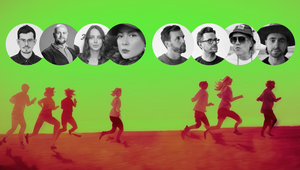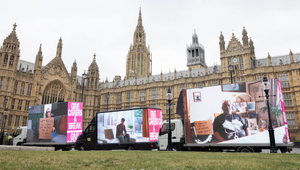
It’s Fragile: Nils Leonard on Writing

On Saturday night, half an hour before Uncommon Creative Studio’s new ad for UK broadcaster ITV was due to play out, Nils Leonard was sitting in The Mill, tuning, tuning, tuning.
‘Television’ was that kind of film. Ached over, sweated over and crafted. There were the five weeks spent immersed in the ITV archives, swithering over decades’ of footage to find the clips that perfectly communicated the idea. The British living rooms, art directed with clear-eyed nostalgia. Billy Boyd Cape’s careful direction. Ed Cooper’s obsessive editing. The warm grade from Cheat’s Toby Tomkins.
And then there’s the writing.
The film hinges on a thoughtful monologue about the power of television narrated by veteran newsreader and journalist Trevor McDonald. It’s a resonant and nuanced script that speaks to the medium's ability to shape the conversation and give voice to the voiceless. It plays over a series of clips from the vaults, which demonstrate ITV’s history of taboo-busting storylines and its current affairs team presence to bear witness to profound moments of social change. So clever is the script that it manages to do all this in 90 seconds while also exploring TV’s potential to make people in minority groups feel less alone. Can there be a more powerful argument to the importance of representation than the simple line, ‘In the end we are changed by what we see, just as we are changed when we are seen’?
Tom Houser and Christopher Keatinge were the primary writers on the project, developing the idea and the prose, though the script was noodled with and batted around as a team effort.
Initially the idea was to leverage the fact that ITV soaps discuss and explore difficult topics in a way that news reports along can’t – but along the way the Tom and Chris found their way to a deeper place, explains Nils. “The guys really got to this thing that it’s not just about seeing things that shock you, it’s about seeing yourself in there and being seen as a minority. We were all there in the review and the hairs on our arms stood up and we were like fuck, we’ve got to make that. We took it along and the guys at ITV felt the same.”
Another goal was to advertise the channel in a way that felt fresh. “If I’m honest, we were trying to find new ways to advertise a channel. Even if you look at the US there’s a lot of repeated gags. ‘Entertainment finding its way into the real world’ or ‘you’re influenced by heroes you like’. There’s a lot of that stuff and you’ve just seen it and seen it,” says Nils. “And actually writing and using performances is something not a lot of people do.”
To get there, the agency spent a lot of time talking to ITV’s screenwriters, who write for some of the UK’s most popular shows, week-in and week-out. Leveraging the craft of writing to promote well-crafted writing may seem like an obvious approach, but it’s one that can make clients and creatives nervous. It’s exposed.
“I think it’s because it’s a risk because with writing, you can change two lines in that script and it will be not as good – and that happened a few times along the journey. Imagine if you didn’t have that last line, it would be the difference between something being really, really good and just OK. And you think, fuck, that stuff is fragile and that’s why I think it can worry people,” reflects Nils. It is fragile. But in the fragility lies beauty.
Trevor McDonald was always the first choice to voice the ad – and the ITV frontman took brought his own insight and experience to the writing, giving the script its heft. His association with ITV stretches back to 1973, when he joined Independent Television News as a reporter. During the '90s he was the lead on the channel’s flagship News at Ten show, and for eight years in the early noughties hosted Tonight with Trevor McDonald. He continues to front unflinching documentaries for the channel – despite retiring twice.
Trevor did not simply lend his rich and reassuring voice to the film. His decades reporting for the channel gave him unparalleled insight into ITV’s place in Britain and, indeed, the role of television. So the team decided to interview Trevor about his experiences (his stories about interviewing Saddam Hussein, says Nils, are an ad for ITV news in themselves). Trusting the incredible talent they had access to turned out to be a savvy move – during the discussion, he said, said ‘I think television’s a mirror, it shows us who we are’ – a line that made it into the final voiceover.
“If you watch the thing back again you’ll hear the cadence in his voice fall when he says ‘it tells us who we are’. It dies at the end because he’s moved by it,” recalls Nils. “And that could only have happened by asking him his legitimate opinion rather than just get him to read a script.”
For context, ITV – or Independent Television – occupies a particular place in British culture. Launched in 1955, it’s an ad-funded broadcaster founded to provide competition to the state-supported BBC. Home of soap operas like Coronation Street and Emmerdale and shows like I’m a Celebrity: Get Me Out of Here that challenge the notion that Game of Thrones marks the end of ‘water cooler TV’, ITV is unashamedly popular and populist. But in the UK, the home of Tall Poppy Syndrome, this populism is not always greeted positively – its shows may have brought topics like transgenderism, breast cancer, gay rights, domestic violence and dementia to the masses in transgressive and creatives ways, the channel has not always been taken seriously for these achievements, argues Nils.
“I think part of ITV’s perception problem is that they speak to so many people: seven million people a week,” he says. “In the States, when you are a commercial creative company and you talk to lots of people there’s a massive respect for that creatively. Over hear we look down our nose at it, particularly in the creative industry.”
'Television' and Uncommon’s other work for ITV, which plunges deep into the collective unconscious by exploring the archetypal characters of storytelling, has forced a reassessment of not only the broadcaster’s image but its substance.
ITV 'Great Characters Make Great Drama' - The Patriarch from Uncommon London on Vimeo.
And that new appraisal has been driven by those campaigns’ writing, by monologues that resist and subvert cliché.
The Television spot – and indeed the series of executions in the Archetypes campaign – also offer up originality in terms of inflection and tempo.
Monologues are not rare in advertising, but in recent years the prosody has become as cliché as the prose. Like well-worn tyre tracks, it’s easy to slip into cosy cadences – the aspirational rhyming manifesto or the faux-patriotic, bombastic ‘People of Britain’ tirade.
“I’m glad that you talk about cadence and rhythm; you can read an ad in syllables. And it’s fucked – why is it you can do that? Because it’s such a familiar shape,” says Nils. “I think there’s something really, really interesting in trying to find different cadences. I think that’s where Donald Glover has succeeded. If you look at Atlanta, how much space is there in those scripts? He’s really not scared to let it be silent. I think what he’s found is a different voice and tone.”
Internally at Uncommon, the creative team like to think about sound and rhythm ahead of visuals in a bid to break writing habits. They read scripts to different music and soundscapes to explore different ways of delivering and arranging the words – for the Television film, Nils said that the a particular breakdown in the Radiohead track ‘Everything in Its Right Place’ proved to be a breakthrough.
It’s not just habit that forces creatives into unoriginal writing rhythms. The age of the pre-roll and snappy social video posts has fostered certain ‘standards’. “I think time length is another thing. Everyone’s trying to optimise everything to fit into 15 seconds, which is why you get really familiar cadences. People see how it works and just think ‘let’s do that’.”
(Not, it has to be said, that Nils decries social media as the death of well-crafted writing. Citing the poet Hollie McNish and the work she shares on Instagram, he reckons there’s plenty of opportunity for writers to push a little harder to explore and exploit different platforms.)
The craft of writing may have been subsumed and distorted by obsession with keywords and SEO, and it may not be must-have toy in the novelty-obsessed industry – but it is at the core of creativity. Nils describes writing as ‘the most powerful tool that we have to drive difference’, but it’s a craft that is all too often relegated.
“My thing is about the relentless search for pairings and phrases and, of course, insights that you’ve never seen before,” he says. “You can have a brilliant idea and write it in a way that’s average.”
CREDITS
Project name: ‘More than TV’
Agency: Uncommon Creative Studio
Client: ITV
Chief Marketing Officer: Rufus Radcliffe
Director of Viewer Marketing: Paul Ridsdale
Head of Marketing - Brand Project: Sian Jones
Footage Researcher: Tom Harris
Media agency: Goodstuff Communications
Production company: Academy Film
Director: Billy Boyd Cape
Production Company Producers: Juliette Harris and Simon Cooper @ Academy
Editor: Ed Cooper @ The Assembly Rooms
DOP: Molly Manning Walker
Post-production: The Mill
VFX Supervisor: James Mac
Post production producer: Ange Toner
Grade: Cheat
Colourist: Toby Tomkins
Soundtrack composer: Luis Almau
Audio post-production: Soundtree
Sound design: Henning Knoepfel
Music Supervisor: Jay James















